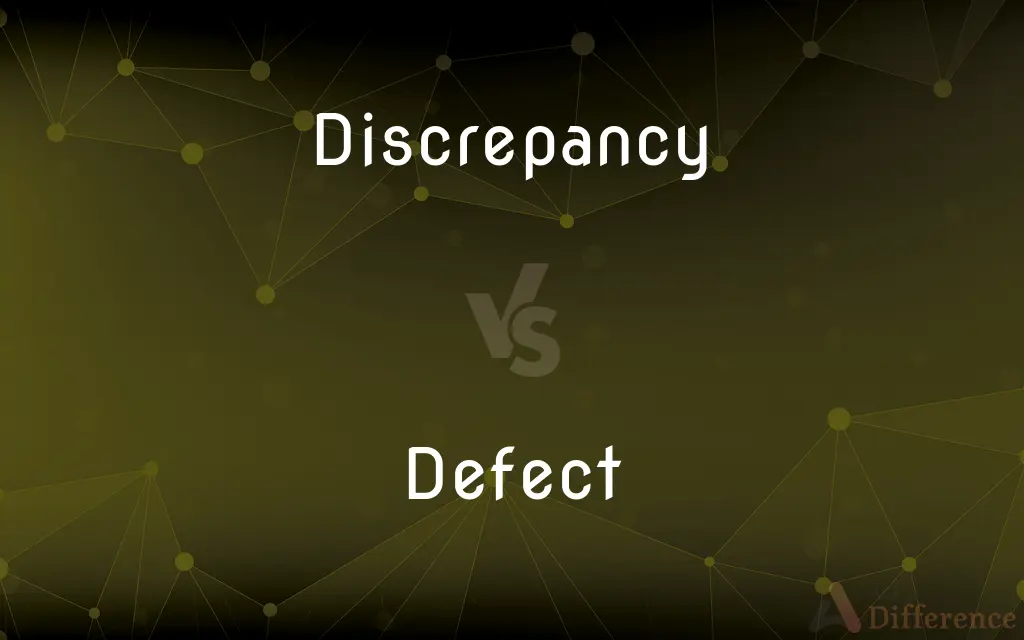Discrepancy vs. Defect — What's the Difference?
By Urooj Arif & Maham Liaqat — Updated on April 8, 2024
Discrepancy involves differences between conflicting facts or claims, highlighting inconsistency, while a defect refers to an imperfection or flaw in an object or system.

Difference Between Discrepancy and Defect
Table of Contents
ADVERTISEMENT
Key Differences
Discrepancy is fundamentally about inconsistencies or differences that emerge when comparing facts, figures, or statements, which can occur in data, narratives, or between expected and actual results. Whereas, a defect denotes an imperfection, fault, or shortcoming in a product, process, or system that deviates from its intended quality or functionality.
In the realm of documentation or financial audits, a discrepancy may refer to unmatched figures or conflicting information that raises questions about accuracy or integrity. On the other hand, a defect in this context could mean a systemic error or failure that impacts the operational efficiency or reliability of a financial system.
When discussing products, a discrepancy might be used to describe a variation in specifications, such as dimensions or color, that may not necessarily affect the product's functionality. Conversely, a defect is a specific flaw or fault in a product that hinders its expected performance, durability, or safety.
In legal and contractual terms, discrepancies often arise from differences in interpretation or execution of agreements, leading to disputes that require resolution. Defects, in this context, could relate to non-compliance with contractual specifications or standards, necessitating corrective action or penalties.
In scientific research, discrepancies can highlight interesting areas for further investigation, often pointing towards variability in results or unaccounted factors. Defects in research, however, typically refer to methodological flaws or errors in data that compromise the validity of the findings.
ADVERTISEMENT
Comparison Chart
Definition
A lack of compatibility or uniformity between facts or figures
An imperfection or shortcoming that impairs functionality or quality
Context
Often found in data, documentation, or narratives
Commonly associated with products, systems, or processes
Impact
May indicate a need for clarification or further investigation
Directly affects performance, safety, or satisfaction
Nature
Subjective and can vary based on perspective
Objective and identifiable based on specific criteria
Resolution
Typically involves further analysis or reconciliation
Requires repair, replacement, or modification
Compare with Definitions
Discrepancy
A mismatch between expected and actual outcomes.
There was a significant discrepancy in the projected and actual sales figures.
Defect
A flaw in a product that affects its functionality.
The device was returned due to a manufacturing defect.
Discrepancy
Conflict between two sets of data.
Researchers are investigating the discrepancy between the two studies' results.
Defect
Error in design leading to failure.
The bridge collapse was attributed to a structural defect.
Discrepancy
Difference in accounts or statements.
The audit revealed a discrepancy in the financial reports.
Defect
A quality that detracts from overall performance.
His argument had one major defect that undermined its credibility.
Discrepancy
Inconsistency in evidence or facts.
Detectives noted a discrepancy in the witness's testimonies.
Defect
Shortcoming in a system that compromises performance.
The software was updated to fix a security defect.
Discrepancy
Variation from a standard.
Any discrepancy in the manufacturing process was documented for review.
Defect
Imperfection in materials.
The sculpture had a small defect on its surface.
Discrepancy
An illogical or surprising lack of compatibility or similarity between two or more facts
There's a discrepancy between your account and his
Defect
An imperfection or lack that causes inadequacy or failure; a shortcoming or deficiency.
Discrepancy
Divergence or disagreement, as between facts or claims; difference.
Defect
To disown allegiance to one's country and take up residence in another
A Soviet citizen who defected to Israel.
Discrepancy
An instance of divergence or disagreement.
Defect
To abandon a position or association, often to join an opposing group
Defected from the party over the issue of free trade.
Discrepancy
An inconsistency between facts or sentiments.
They found a discrepancy between the first set of test results and the second, and they're still trying to figure out why.
Defect
A fault or malfunction.
A defect in the ear or eye; a defect in timber or iron; a defect of memory or judgment
Discrepancy
The state or quality of being discrepant.
Defect
The quantity or amount by which anything falls short.
Discrepancy
A difference between conflicting facts or claims or opinions;
A growing divergence of opinion
Defect
(math) A part by which a figure or quantity is wanting or deficient.
Discrepancy
An event that departs from expectations
Defect
(intransitive) To abandon or turn against; to cease or change one's loyalty, especially from a military organisation or political party.
Defect
(military) To desert one's army, to flee from combat.
Defect
(military) To join the enemy army.
Defect
(law) To flee one's country and seek asylum.
Defect
Want or absence of something necessary for completeness or perfection; deficiency; - opposed to superfluity.
Errors have been corrected, and defects supplied.
Defect
Failing; fault; imperfection, whether physical or moral; blemish; as, a defect in the ear or eye; a defect in timber or iron; a defect of memory or judgment.
Trust not yourself; but, your defects to know,Make use of every friend - and every foe.
Among boys little tenderness is shown to personal defects.
Defect
To fail; to become deficient.
Defect
To abandon one country or faction, and join another.
Defect
To injure; to damage.
Defect
An imperfection in a bodily system;
Visual defects
This device permits detection of defects in the lungs
Defect
A failing or deficiency;
That interpretation is an unfortunate defect of our lack of information
Defect
An imperfection in a device or machine;
If there are any defects you should send it back to the manufacturer
Defect
A mark or flaw that spoils the appearance of something (especially on a person's body);
A facial blemish
Defect
Desert (a cause, a country or an army), often in order to join the opposing cause, country, or army;
If soldiers deserted Hitler's army, they were shot
Common Curiosities
Are discrepancies always negative?
Not necessarily. Discrepancies can reveal areas for improvement or highlight unexpected but beneficial outcomes.
What is the difference between a discrepancy and a defect?
A discrepancy refers to an inconsistency or difference, often in data or statements, while a defect denotes a flaw or imperfection affecting functionality or quality.
How do discrepancies affect research?
Discrepancies in research can point to new questions or areas for further study, indicating variability in results.
How can defects impact customer satisfaction?
Defects significantly impact customer satisfaction by affecting product performance, safety, and perceived value.
Can defects be fixed?
Many defects can be fixed through repairs, modifications, or improvements, though some may require complete replacement of the faulty component.
Are all defects immediately apparent?
No, some defects may only become apparent under certain conditions or after prolonged use.
Do discrepancies always require action?
While not all discrepancies require action, they often necessitate review or explanation to understand their implications fully.
How are discrepancies resolved?
Resolving discrepancies often involves further investigation, analysis, or reconciliation of conflicting information.
Can a discrepancy lead to finding a defect?
Yes, identifying discrepancies can sometimes lead to the discovery of defects, especially in quality control or auditing processes.
Is a defect always a physical flaw?
No, defects can also include errors in software, systems, or processes, not just physical products.
How do discrepancies and defects relate to quality control?
Both discrepancies and defects are critical considerations in quality control, aiming to ensure products and services meet established standards and expectations.
What role do discrepancies play in financial audits?
Discrepancies in financial audits can signal errors, fraud, or areas requiring clarification, leading to further investigation.
Why is it important to identify discrepancies?
Identifying discrepancies is crucial for ensuring accuracy, consistency, and reliability in various fields, including research, finance, and manufacturing.
Can a product have a defect but no discrepancies?
Yes, a product can have a defect that is consistent across all items, meaning there's no discrepancy but still a flaw.
How do companies manage defects?
Companies manage defects through quality control processes, recalls, and continuous improvement programs.
Share Your Discovery

Previous Comparison
Eccentric vs. Crank
Next Comparison
Dame vs. BaronessAuthor Spotlight
Written by
Urooj ArifUrooj is a skilled content writer at Ask Difference, known for her exceptional ability to simplify complex topics into engaging and informative content. With a passion for research and a flair for clear, concise writing, she consistently delivers articles that resonate with our diverse audience.
Co-written by
Maham Liaqat













































